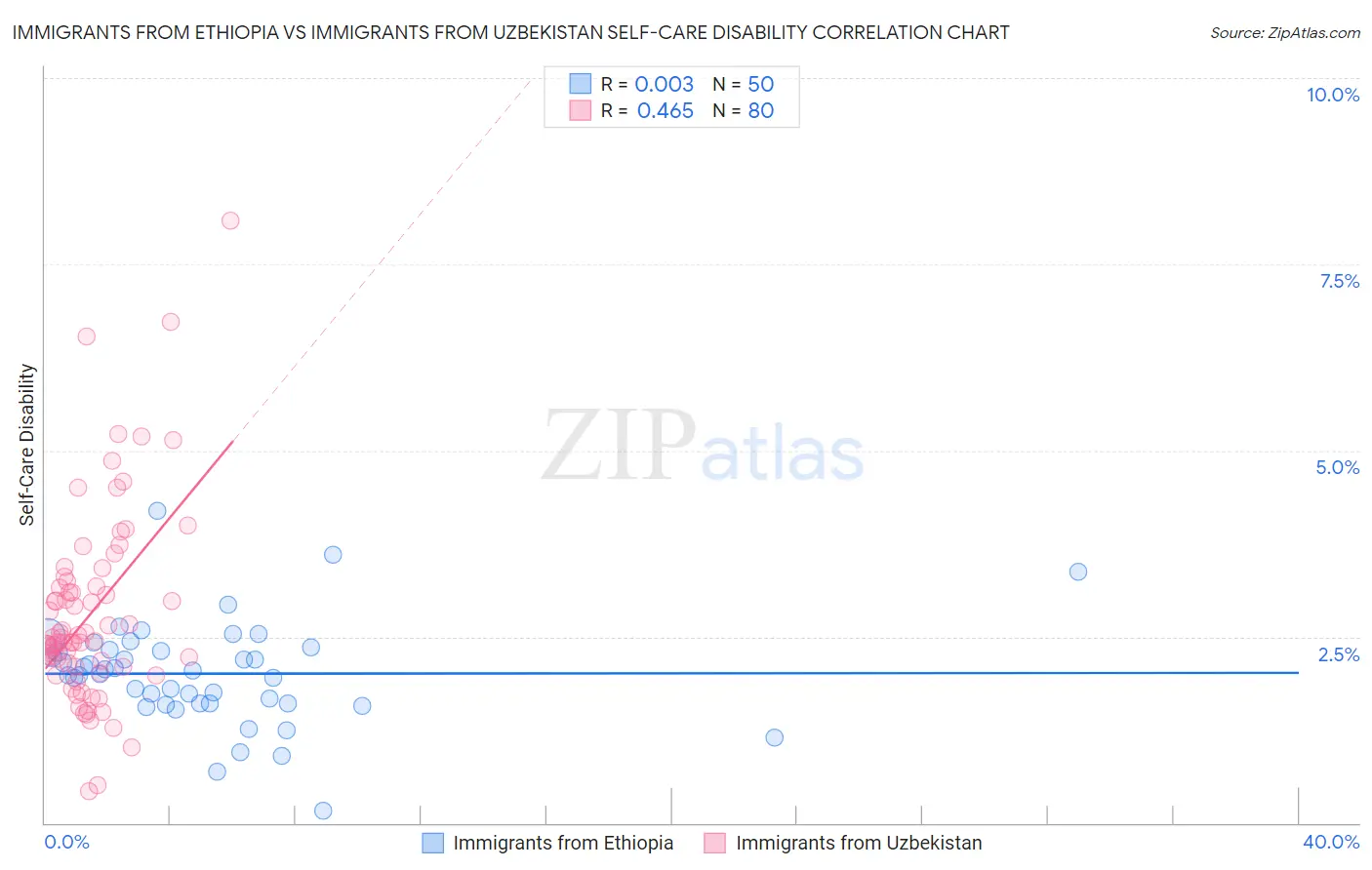Immigrants from Ethiopia vs Immigrants from Uzbekistan Self-Care Disability
COMPARE
Immigrants from Ethiopia
Immigrants from Uzbekistan
Self-Care Disability
Self-Care Disability Comparison
Immigrants from Ethiopia
Immigrants from Uzbekistan
2.2%
SELF-CARE DISABILITY
100.0/ 100
METRIC RATING
12th/ 347
METRIC RANK
2.9%
SELF-CARE DISABILITY
0.0/ 100
METRIC RATING
325th/ 347
METRIC RANK
Immigrants from Ethiopia vs Immigrants from Uzbekistan Self-Care Disability Correlation Chart
The statistical analysis conducted on geographies consisting of 211,457,724 people shows no correlation between the proportion of Immigrants from Ethiopia and percentage of population with self-care disability in the United States with a correlation coefficient (R) of 0.003 and weighted average of 2.2%. Similarly, the statistical analysis conducted on geographies consisting of 118,703,600 people shows a moderate positive correlation between the proportion of Immigrants from Uzbekistan and percentage of population with self-care disability in the United States with a correlation coefficient (R) of 0.465 and weighted average of 2.9%, a difference of 31.9%.

Self-Care Disability Correlation Summary
| Measurement | Immigrants from Ethiopia | Immigrants from Uzbekistan |
| Minimum | 0.17% | 0.43% |
| Maximum | 4.2% | 8.1% |
| Range | 4.0% | 7.6% |
| Mean | 2.0% | 2.8% |
| Median | 2.0% | 2.5% |
| Interquartile 25% (IQ1) | 1.6% | 2.1% |
| Interquartile 75% (IQ3) | 2.3% | 3.2% |
| Interquartile Range (IQR) | 0.71% | 1.1% |
| Standard Deviation (Sample) | 0.69% | 1.3% |
| Standard Deviation (Population) | 0.69% | 1.3% |
Similar Demographics by Self-Care Disability
Demographics Similar to Immigrants from Ethiopia by Self-Care Disability
In terms of self-care disability, the demographic groups most similar to Immigrants from Ethiopia are Ethiopian (2.2%, a difference of 0.010%), Immigrants from South Central Asia (2.2%, a difference of 0.050%), Sudanese (2.2%, a difference of 0.16%), Luxembourger (2.2%, a difference of 0.17%), and Okinawan (2.2%, a difference of 0.18%).
| Demographics | Rating | Rank | Self-Care Disability |
| Zimbabweans | 100.0 /100 | #5 | Exceptional 2.2% |
| Filipinos | 100.0 /100 | #6 | Exceptional 2.2% |
| Immigrants | Bolivia | 100.0 /100 | #7 | Exceptional 2.2% |
| Bolivians | 100.0 /100 | #8 | Exceptional 2.2% |
| Immigrants | Nepal | 100.0 /100 | #9 | Exceptional 2.2% |
| Sudanese | 100.0 /100 | #10 | Exceptional 2.2% |
| Immigrants | South Central Asia | 100.0 /100 | #11 | Exceptional 2.2% |
| Immigrants | Ethiopia | 100.0 /100 | #12 | Exceptional 2.2% |
| Ethiopians | 100.0 /100 | #13 | Exceptional 2.2% |
| Luxembourgers | 100.0 /100 | #14 | Exceptional 2.2% |
| Okinawans | 100.0 /100 | #15 | Exceptional 2.2% |
| Immigrants | Kuwait | 100.0 /100 | #16 | Exceptional 2.2% |
| Immigrants | Saudi Arabia | 100.0 /100 | #17 | Exceptional 2.2% |
| Immigrants | Taiwan | 100.0 /100 | #18 | Exceptional 2.2% |
| Immigrants | Eritrea | 100.0 /100 | #19 | Exceptional 2.2% |
Demographics Similar to Immigrants from Uzbekistan by Self-Care Disability
In terms of self-care disability, the demographic groups most similar to Immigrants from Uzbekistan are Cherokee (2.9%, a difference of 0.53%), Seminole (2.9%, a difference of 0.63%), Comanche (2.9%, a difference of 0.75%), Paiute (2.9%, a difference of 0.94%), and Black/African American (2.9%, a difference of 1.0%).
| Demographics | Rating | Rank | Self-Care Disability |
| Assyrians/Chaldeans/Syriacs | 0.0 /100 | #318 | Tragic 2.8% |
| Spanish American Indians | 0.0 /100 | #319 | Tragic 2.9% |
| Chickasaw | 0.0 /100 | #320 | Tragic 2.9% |
| Navajo | 0.0 /100 | #321 | Tragic 2.9% |
| Comanche | 0.0 /100 | #322 | Tragic 2.9% |
| Seminole | 0.0 /100 | #323 | Tragic 2.9% |
| Cherokee | 0.0 /100 | #324 | Tragic 2.9% |
| Immigrants | Uzbekistan | 0.0 /100 | #325 | Tragic 2.9% |
| Paiute | 0.0 /100 | #326 | Tragic 2.9% |
| Blacks/African Americans | 0.0 /100 | #327 | Tragic 2.9% |
| Hopi | 0.0 /100 | #328 | Tragic 2.9% |
| Cajuns | 0.0 /100 | #329 | Tragic 2.9% |
| Nepalese | 0.0 /100 | #330 | Tragic 3.0% |
| Lumbee | 0.0 /100 | #331 | Tragic 3.0% |
| Kiowa | 0.0 /100 | #332 | Tragic 3.0% |